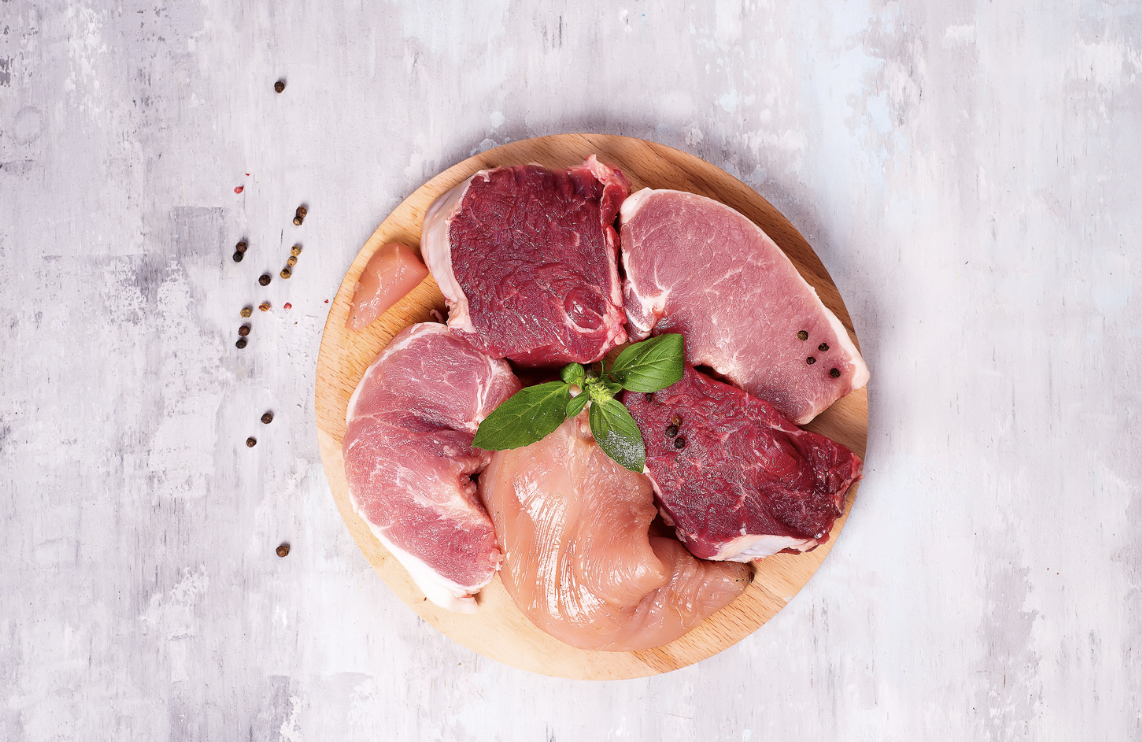Venison Dog Food: A Nutrient Rich Option For Dogs With Allergies

Venison is a lean novel protein that is positively packed with essential nutrients. High in B vitamins for energy and zinc for immunity and organ function, deer meat is one of the top novel protein choices amongst dog owners. Venison is also a more sustainable protein option, and you’ll find that most brands offering venison formulas source their meat ethically.
Beef vs. Venison Vs. Lamb- Pros and Cons of Each

Venison Dog Food
| Pros: | Cons: |
| Novel protein: Venison is considered a novel protein, meaning it is less commonly found in commercial dog food. This makes it suitable for dogs with known food sensitivities or allergies. | Availability: Venison dog food can be harder to find compared to more common proteins like beef or chicken. |
| Lean protein: Venison is typically low in fat, making it a good option for dogs that require a leaner protein source. | Sourcing challenges: Finding a reliable source of venison that is free from additives or potential contaminants may be more difficult. |
| Nutrient profile: Venison provides essential nutrients like iron, zinc, and B vitamins, which are beneficial for your dog’s overall health. | Cost: Similar to lamb, venison is often more expensive than other protein options, which may impact affordability. |
✔️Good for dogs with allergies
✔️Good for dogs that need to lose weight
✔️Nutrient Rich
Lamb Dog Food
| Pros: | Cons: |
| Nutrient-rich: Lamb is a good source of essential amino acids, vitamins, and minerals, including iron and zinc. | Higher fat content: Lamb can be higher in fat compared to other protein sources, so portion control is important to prevent weight gain. |
| Highly digestible: It is generally considered easily digestible, making it suitable for dogs with sensitive stomachs or digestive issues. | Cost: Lamb is often more expensive than beef or chicken, which can make it a less affordable option for some dog owners. |
| Novel protein: If your dog has previously been exposed to common proteins like chicken or beef and developed sensitivities, lamb can be a novel protein source that may reduce the risk of allergies. |
✔️Good for dogs with allergies
✔️Good for dogs that need to gain weight
✔️Nutrient Rich
Beef Dog Food
| Pros: | Cons: |
| Accessibility: Beef is widely available and commonly used in commercial dog food. | Potential for allergies: Some dogs may develop allergies or sensitivities to beef due to its widespread use in commercial dog food. |
| Balanced nutrient profile: Beef offers a good balance of essential amino acids, vitamins, and minerals that support your dog’s overall health. | Fat content: Depending on the cut of beef, it can be higher in fat, so it’s important to choose lean cuts or control portion sizes to prevent weight gain. |
| Affordability: Beef is often more affordable compared to lamb or venison, making it a cost-effective option for dog owners. | Digestibility: While most dogs can digest beef without any issues, some individuals may experience digestive upset or sensitivities. |
✔️Nutrient Rich
✔️Available Everywhere
How Can I Feed My Dog Venison?
Venison dog food is available in various forms to suit different preferences and dietary needs. Here are some common forms of venison dog food:
Dry kibble Venison Dog Food

Dry venison dog food is the most common form available. It is manufactured by combining venison meat or meal with other ingredients, such as vegetables, fruits, and grains. Dry kibble provides convenience and a longer shelf life. [Least Nutritious]

Wet or canned
Venison dog food can also come in wet or canned form. This type of food contains a higher moisture content and may offer a more palatable option for dogs that prefer softer textures. Wet venison dog food is typically sealed in cans or pouches.
Raw Venison Dog Food

Raw venison dog food is minimally processed and typically includes raw venison meat, organs, and sometimes bones.
We Feed Raw’s Raw Venison Patty recipe is a great option for dogs who need a novel protein diet or are going on an elimination diet since it contains very limited ingredients. 80% venison, 10% organ meat, and 10% bone, the only other ingredients in this recipe are added vitamins and minerals.
| First 5 Ingredients | Venison, Beef Heart, Beef Liver, Beef Kidney, Beef Necks (with bone) |
| Guaranteed Analysis (crude) | 13% Protein — 10.7% Fat — 1% Fiber — 69.4% Moisture |
| Calorie Content | 51 kcal/oz |
Save 25% off your first subscription trial box.

Freeze-dried: Freeze-dried venison dog food undergoes a process where moisture is removed while retaining the nutritional integrity of the ingredients.
Dehydrated or Air-Dried Venison Dog Food

Dehydrated or air-dried venison dog food involves a drying process that removes moisture from the ingredients while preserving nutrients. This form of food often requires rehydration before feeding by adding water to restore the original texture.

Venison-based treats

Along with complete meals, venison is commonly used to make dog treats. Venison treats can come in various forms such as jerky, biscuits, or chew sticks. These treats provide a flavorful and protein-rich snack option.

A Nutritious Option For dogs
Venison dog food offers a nutritious option for dogs, providing essential vitamins and minerals to support their overall health. High-quality dry dog food formulations often incorporate venison as a primary protein source. These formulations are carefully balanced to ensure optimal nutrition for dogs of all life stages.
To meet the nutritional needs of dogs, venison dog food is enriched with various vitamins and minerals. It may include vitamin D3 supplements, which help promote bone health and calcium absorption. Fatty acids, such as omega-3 and omega-6, are often added to support healthy skin and coat. Potassium chloride is included as a source of essential minerals, while mixed tocopherols contribute vitamin E, an antioxidant that helps protect cells from damage. Pyridoxine hydrochloride, also known as vitamin B6, is essential for proper nerve function, and manganese proteinate aids in bone development and metabolism.
Venison dog food formulations also contain essential minerals like iron, copper, and zinc proteinate to support various bodily functions. These minerals play important roles in enzymatic reactions, immune function, and overall well-being. Vitamins such as vitamin B12, thiamine mononitrate, and folic acid are often included to support energy metabolism and maintain a healthy nervous system. Other essential nutrients found in venison dog food may include calcium iodate, biotin, calcium pantothenate, and choline chloride.
FAQ – Venison Dog Food
Is venison too rich for dogs?
Venison can be a nutritious protein source for dogs, but it can be rich in fat. It’s important to introduce venison gradually and monitor your dog for any digestive issues. Moderation is key, and it’s always best to consult with your veterinarian to determine if venison is suitable for your dog’s individual dietary needs.
Why is venison dog food hard to find?
Venison dog food may be less common compared to more mainstream protein sources like chicken or beef. This could be due to the availability and sourcing challenges associated with venison. Additionally, venison may be more expensive to produce, resulting in limited options in the market.
Is venison good for dogs with sensitive stomachs?
Venison can be a good option for dogs with sensitive stomachs. It is considered a novel protein source, meaning it is less commonly encountered in commercial dog food. This can make it suitable for dogs with food sensitivities or allergies. However, it’s important to introduce venison gradually to assess your dog’s individual tolerance and consult with your veterinarian for personalized advice.
Can dogs eat venison every day?
While some dogs can tolerate venison as a regular part of their diet, it’s generally recommended to provide variety in a dog’s protein sources. Rotating proteins helps ensure a balanced nutrient intake and reduces the risk of developing sensitivities to specific proteins over time. Consult with your veterinarian to determine the best feeding routine for your dog.
Is venison or bison better for dogs?
Both venison and bison can be excellent protein sources for dogs. The choice between the two often depends on the individual dog’s preferences and dietary requirements. Some dogs may have sensitivities or allergies to one protein but not the other. It’s advisable to introduce each protein gradually and monitor your dog’s response to determine which one is better suited for them.
re there any benefits of feeding venison to dogs?
Venison offers several potential benefits for dogs. It is a lean source of protein that can support muscle development and maintenance. Additionally, it contains essential nutrients like iron, zinc, and B vitamins. The novelty of venison can also be advantageous for dogs with food sensitivities or allergies, as they may not have been previously exposed to this protein.
Can venison help dogs with food allergies?
Venison is often considered a hypoallergenic protein source for dogs. It is not a common ingredient in most commercial dog foods, reducing the likelihood of dogs developing allergies or sensitivities to it. If your dog has been diagnosed with specific food allergies, consult with your veterinarian to determine if venison is an appropriate choice for their dietary needs.
Are there any risks associated with feeding venison to dogs?
While venison can be a healthy protein source, there are a few considerations to keep in mind. It’s important to source venison from reputable suppliers to ensure quality and minimize the risk of bacterial contamination. Additionally, the fat content in venison can be higher compared to other proteins, so portion control and moderation are crucial to prevent weight gain or gastrointestinal issues.
Should I cook venison before feeding it to my dog?
Feeding raw venison to dogs is not recommended due to the potential presence of bacteria, such as salmonella or E. coli. It’s best to cook venison thoroughly before offering it to your dog. Proper cooking kills any harmful bacteria and makes the meat safer to consume.
Can puppies eat venison dog food?
Venison dog food can be suitable for puppies, but it’s important to ensure it meets their specific nutritional requirements. Puppies need a balanced diet that supports their growth and development. Consult with your veterinarian to determine the appropriate puppy food and portion sizes, and follow their recommendations for introducing new proteins like venison to your puppy’s diet.
Are vitamin supplements like vitamin E, thiamine mononitrate, and vitamin B12 necessary in venison dog food?
Vitamin supplements, including vitamin E, thiamine mononitrate, and vitamin B12, are commonly added to venison dog food formulations to ensure a complete and balanced nutrient profile. Vitamin E is a potent antioxidant that helps protect cells from oxidative damage, while thiamine mononitrate (a form of vitamin B1) is essential for energy metabolism and proper nerve function. Vitamin B12 supports the formation of red blood cells and neurological health. By including these vitamins in venison dog food, it helps meet the dog’s daily nutritional requirements.
What is the purpose of minerals like sodium selenite, iron proteinate, copper, and calcium iodate in venison dog food?
Minerals play crucial roles in a dog’s overall health, and they are often included in venison dog food formulations. Sodium selenite is a source of selenium, which acts as an antioxidant and supports immune function. Iron proteinate and copper are essential minerals involved in red blood cell formation, oxygen transport, and enzyme function. Calcium iodate provides iodine, which is necessary for proper thyroid function. These minerals are added to venison dog food to ensure dogs receive the necessary minerals for their vital physiological processes.
